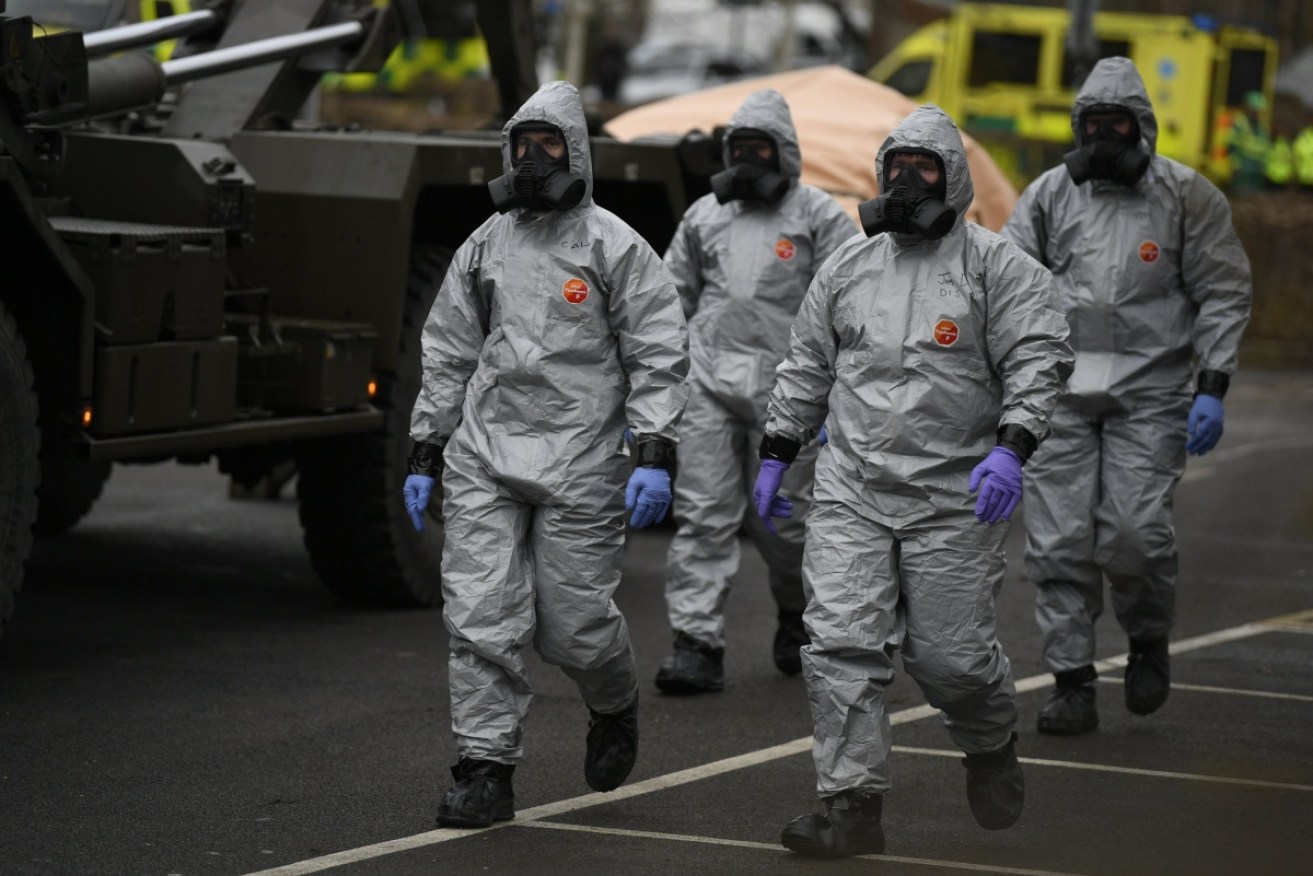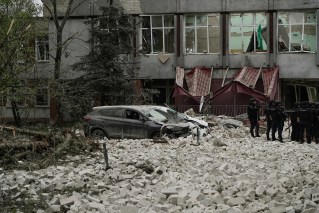Poison Ivan: A brief history of Russian assassinations using toxins


Military personnel in Salisbury where Russian ex-spy Sergei Skripal and his daughter Yulia Skripal were attacked with a nerve agent. Photo: AAP
The Cold War may be over, but Russia’s penchant for the use of poison to eliminate its enemies is as robust today as it was at the height of diplomatic and military tensions under the old Soviet Union.
British Prime Minister Theresa May told the world on Tuesday it was “highly likely” Russia was behind the poisoning of former Russian spy Sergei Skripal and his daughter Yulia, in the southern town of Salisbury.
The poison used was confirmed as Novichok, a nerve agent first developed by the Soviet Union in the 1970s.
While Russia branded Ms May’s claim as an “information and political campaign based on provocation”, the Russians – and before them the Soviets – clearly have form in this area.
Here are some, but not all, of the alleged assassinations and attempted assassinations by poison, committed by Russia or the Soviet Union in recent years.
Alexander Litvinenko
Dissident Russian spy Alexander Litvinenko was killed in 2006 after someone slipped the highly radioactive polonium-210 into his tea. An autopsy found Mr Litvinenko’s body had five times the lethal dose of the poison.
After fleeing Russia in 2000, Mr Litvinenko became a fierce critic of President Vladimir Putin and Russia’s security service, the FSB. He also wrote a book accusing the FSB of being complicit in the 1999 apartment bombings that Mr Putin had blamed on Chechen rebels.

Alexander Litvinenko died just three weeks after he was poisoned. Photo: AAP
One witness at the 2015 trial said that one suspect (and former KGB agent) Dmitry Kovtun had spoken openly about Russia’s intention to kill Mr Litvinenko and that his murder was intended to “set an example”.
In 2004, Mr Litvinenko wrote in The New York Times: “The view inside our agency was that poison is just a weapon, like a pistol. It’s not seen that way in the West, but it was just viewed as an ordinary tool.”
Georgi Markov
Like something from a James Bond novel was the murder of Bulgarian dissident Georgi Markov. The journalist, broadcaster and playwright defected in 1968 and became a sarcastic and unrelenting critic of the Bulgarian regime.

Georgi Markov worked for the Bulgarian language service of the BBC. Photo: AAP
In 1978, while waiting for a bus near London’s Waterloo Bridge, Mr Markov felt a sharp, bite-like pain in his leg and turned to find a man picking up an umbrella.
He became ill immediately and was rushed to hospital where doctors discovered in his leg a 1.7 millimetre pellet that was later found to contain the highly toxic protein, ricin. The pellet had been injected from the tip of the umbrella. Mr Markov died four days later.
Former KGB general Oleg Kalugin told Radio Free Europe in 2015 that while Mr Markov was killed by the Bulgarian secret service, former KGB boss and Soviet president Yury Andropov approved the assassination.

A replica of the umbrella used on Markov on display in International Spy Museum in Washington, DC. Photo: Getty
Anna Politkovskaya
Journalist Anna Politkovskaya was fatally shot in an elevator of her apartment building in 2006. But two years previous, someone had tried to assassinate her using poison.
For seven years Ms Politkovskaya refused to give up on her coverage of the Russian invasion of Chechnya, and her criticism of Mr Putin and corruption in Russia.
In 2004, while travelling to North Ossetia to help negotiate during the school siege of Beslan in which 1000 people were held hostage, she boarded a flight but fell ill and lost consciousness after drinking tea served by a flight attendant.

Politkovskaya’s book, A Russian Diary, was subtitled A Journalist’s Final Account of Life, Corruption, and Death in Putin’s Russia. Photo: Getty
In a 2004 article for the Guardian newspaper, Ms Politkovskaya described the moment she woke up in the hospital to a nurse telling her: “My dear, they tried to poison you.”
Vladimir Kara-Murza
Journalist and Russian opposition politician Vladimir Kara-Murza has survived attempted assassination by poison twice.
In May 2015, Mr Kara-Murza suddenly fell ill during a meeting which had followed a two-hour lunch. He experienced rapid heart rate, high blood pressure, sweating and vomiting. After falling into a coma, he was diagnosed with poisoning.

Vladimir Kara-Murza was poisoned twice in less than two years. Photo: Getty
In February 2017, Mr Kara-Murza was hospitalised with the same symptoms he had suffered in 2015 and was placed in a medically-induced coma. Doctors concluded he had been subjected to “toxic influence of an unknown substance”.
Mr Kara-Murza’s doctors have reportedly told him he is unlikely to survive a third attempt.
Viktor Yushchenko
Viktor Yushchenko was the independent candidate in the 2004 presidential election in Ukraine. As a progressive critical of Russia and with a pro-Western stance, he soon made himself an enemy of the Kremlin.
In September 2004 he became seriously ill and was flown to Austria for treatment where he was diagnosed with acute pancreatitis, attributed to a serious viral infection and chemical substances.
A Dutch toxicologist found dioxin levels in Mr Yushchenko’s blood 6000 times above normal.
His appearance was also greatly altered, with his face becoming jaundiced, bloated, and pockmarked.

Viktor Yushchenko before and after the dioxin poisoning. Photo: Getty
Mr Yushchenko claimed he had been poisoned by government agents, specifically three men who had attended a dinner with him.
Ukrainian prosecutors said Russia has refused to extradite one of the men, the former deputy chief of the Ukrainian secret service, Volodymyr Satsyuk, as he held dual Russian and Ukrainian citizenship.








